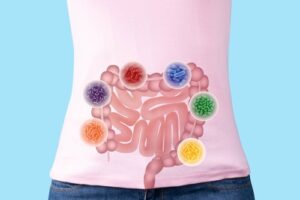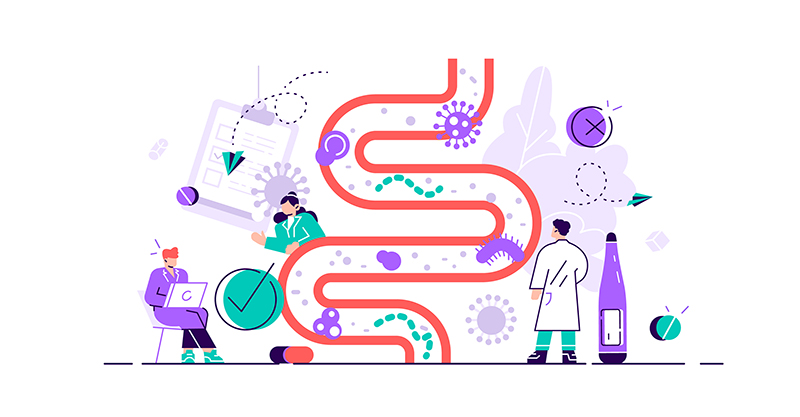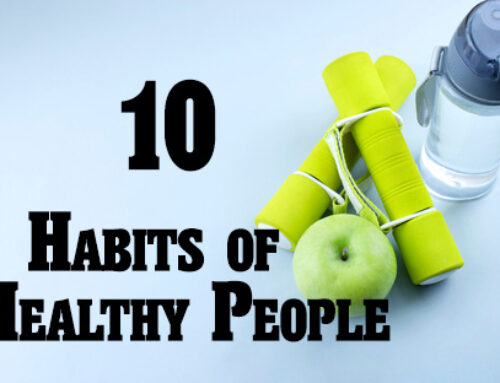All disease begins in the gut.
-Hippocrates
 Hippocrates stated the above quote more than 2,000 years ago, but we’re only now coming to understand it fully. Health research since the late 1990s has revealed that a healthy gut is crucial to overall health. In fact, we are learning each day that an unhealthy gut contributes to a wide range of diseases including diabetes, obesity, rheumatoid arthritis, autism spectrum disorder, depression, and chronic fatigue syndrome. In this next century, there will be an explosion of medical treatments developed to restore intestinal health and the integrity of the gut barrier. But why wait until then? What can you do about it now?
Hippocrates stated the above quote more than 2,000 years ago, but we’re only now coming to understand it fully. Health research since the late 1990s has revealed that a healthy gut is crucial to overall health. In fact, we are learning each day that an unhealthy gut contributes to a wide range of diseases including diabetes, obesity, rheumatoid arthritis, autism spectrum disorder, depression, and chronic fatigue syndrome. In this next century, there will be an explosion of medical treatments developed to restore intestinal health and the integrity of the gut barrier. But why wait until then? What can you do about it now?
Our gut is home to approximately 100,000,000,000,000 (100 trillion) microorganisms. Because it is such a big number, our human brains can not really comprehend it. With over 400 known diverse bacterial species, the human gut contains 10 times more bacteria than all the human cells in the entire body. Notably, you could say that we are more bacterial than we are human! We’ve only recently begun to understand the extent of the gut flora’s role in human health and disease.
The gut flora promotes normal gastrointestinal function, provides protection from infection, regulates metabolism and comprises more than 75% of our immune system. Dysregulated gut flora has been linked to diseases ranging from autism and depression to autoimmune conditions like Hashimoto’s, inflammatory bowel disease, and type 1 diabetes.
What causes an unhealthy gut?
■ Antibiotics and other medications like birth control and NSAIDs
■ Diets high in refined carbohydrates, sugar, and processed foods
■ Diets low in fermentable fibers
■ Dietary toxins like wheat and industrial seed oils that cause leaky gut
■ Chronic stress
■ Chronic infections
■ Formula fed as an infant instead of breast-fed
 Of these factors, antibiotics have the most profound deleterious effect on the gut. An antibiotic will rapidly reduce the number of gut flora and can change the diverse composition of the microbiota. This alteration can cause a shift in hormone production, nutrient absorption, and allow harmful bacterial strains to gain a foothold in the gut. The effect of frequent antibiotic use in children has been linked to learning disabilities, ADHD, eczema, and many other syndromes and diseases.
Of these factors, antibiotics have the most profound deleterious effect on the gut. An antibiotic will rapidly reduce the number of gut flora and can change the diverse composition of the microbiota. This alteration can cause a shift in hormone production, nutrient absorption, and allow harmful bacterial strains to gain a foothold in the gut. The effect of frequent antibiotic use in children has been linked to learning disabilities, ADHD, eczema, and many other syndromes and diseases.
How does an unhealthy gut cause disease?
For years, we have understood that when the bacteria in the gut shift from a healthy diverse community of friendly microbes to a less than optimal environment, our health suffers. How exactly this happens is just beginning to be understood. Think about this: the food we eat may technically never enter the body! The gut is a hollow tube that passes from the mouth to the anus. When food is broken down, only selected particles enter the body and into the bloodstream. Anything that goes into the gut and is not absorbed, will pass right on through the other end. This is, in fact, one of the most important functions of the gut: to prevent indigestible foods and other foreign substances from entering the body. If the selectivity of the gut breaks down, we will have a more permeable intestinal wall, commonly referred to as a “Leaky Gut”.
When the intestinal barrier becomes permeable (i.e. “leaky gut syndrome”), large protein molecules escape into the bloodstream. Since these proteins do not belong outside of the gut, the body mounts an immune response and attacks them. Studies show that these attacks play a role in the development of autoimmune diseases like Hashimoto’s and type 1 diabetes, etc. This effectively is a case of mistaken identity. The immune system thinks that it is attacking a foreign substance, but in fact, it is attacking the thyroid cells (Hoshimoto’s), the pancreas cells (Type 1 diabetes), the intestinal cells (Crohn’s disease), etc. The leaky gut syndrome use to be laughed at by mainstream researchers who favored a genetic cause to these diseases. Now, many more conventional researchers and doctors are revealing results of their studies showing that a leaky gut is a major contributor to autoimmune diseases.
A crucial point to understand is that you do not have to have gut symptoms to have a leaky gut. Someone with leaky gut may have irritable bowel, chronic constipation, and/or bloating. But, leaky gut can manifest simply as eczema, psoriasis, heart disease, mental illness, depression, or an autoimmune condition.
 The Gluten-Leaky Gut Connection
The Gluten-Leaky Gut Connection
One reason we recommend people reduce or eliminate their gluten intake is because gluten contains a protein called gliadin, which has been shown to increase zonulin production. Researchers have identified that zonulin increases intestinal permeability in humans. Zonulin has been linked to most if not all autoimmune diseases –including celiac disease, type 1 diabetes, multiple sclerosis, rheumatoid arthritis and inflammatory bowel disease. As a matter of fact, researchers have found that they can induce type 1 diabetes almost immediately in animals by exposing them to zonulin. Researches do not believe that everyone who ingests gluten will develop a leaky gut. However, we do not know who will and who will not develop the syndrome. My recommendation is that gluten intake be minimal to none to be on the safe side.
What is the takeaway?
Leaky gut and bad gut flora are common because of our modern lifestyle. If you have a leaky gut, you probably have bad gut flora, and vice versa. When your gut flora and gut barrier are impaired, you will be inflamed. Period. This systemic inflammatory response then leads to the development of autoimmunity. While leaky gut and bad gut flora may manifest as digestive trouble, in many people it does not. To adequately address these conditions, you must rebuild healthy gut flora and restore the integrity of your intestinal barrier. This is especially true if you have any kind of autoimmune disease, whether you experience digestive issues or not.
How To Heal The Gut
The most obvious first step in maintaining a healthy gut is to avoid all of the things I listed above that destroy gut flora and damage the intestinal barrier. Of course that is not always possible, especially in the case of chronic stress and infections. Nor did we have any control over whether we were breast-fed.
■ Remove all food toxins from your diet.
■ Maximize your digestive capacity using supplemental acid and enzymes.
■ Eat plenty of fermentable fibers (starches like sweet potato, yam, yucca, etc.).
■ Eat fermented foods like kefir, yogurt, sauerkraut, kimchi, etc., and/or take a high-quality, multi-species probiotic.
■ Treat any intestinal pathogens (such as parasites) that may be present.
■ Take steps to manage your stress.
Healing the gut can seem like an arduous task full of restrictions that takes all the fun out of life. However, the reality is that fixing the gut is what gives back the fun in life. Fixing the gut can help reduce pain, reduce medication use, lift the chains of depression, while helping to improve and prevent autoimmune disorders. By employing a few steps the gut can be healed and life can be restored.
Step 1: Remove All Food Toxins
Although the practicality of removing ALL food toxins is most likely impossible for Americans, this should still be the goal if you’re trying to heal the gut. Start with “Food By Man.” These foods are produced in a factory, they come out of a box, they are found in the middle of the grocery store, and they cause disease! Foods laced with high fructose corn syrup, processed grains, trans fats, soybean oils, and added sugars should all be avoided as they feed the microbial imbalance in our gut leading to a “Leaky Gut” and increased inflammation.
When shopping for food in the grocery store, stick to the outside of the store. Stick to foods that don’t come with a food label (Kale doesn’t need one). If the healthy food you’re considering does have a label make sure you can pronounce all of the ingredients and you can recognize their source.
Step 2: Maximize Your Digestive Capacity With The Proper Stomach pH
Low stomach acid is a prerequisite to healthy digestion. The breakdown and absorption of nutrients occurs within a narrow range of acidity in the stomach. If there isn’t enough acid, the normal chemical reactions required to absorb nutrients is impaired. Without the proper amount of acid, proteins and carbohydrates putrefy in the gut, and may cause gas, bloating, heartburn and other digestive issues. At the same time, proteins that escape digestion may end up in the bloodstream. Since this is not supposed to happen, the body reacts to these proteins as if they were foreign invaders, causing allergic and autoimmune responses. There are numerous causes of low stomach acid. The most common are: H. pylori infection, chronic stress, acid suppressing drugs, low animal protein intake, and increased age.
Restoring proper acid production starts with reducing some of the common causes. Testing and treatment of H. pylori, reduction in chronic lifestyle stressors, limiting acid suppressing drugs, and increasing the intake pH lowering foods. Apple cider vinegar and hydrochloric acid supplementation can lower the stomach’s pH. Taking 2 oz. of apple cider vinegar prior to each meal can help aid in digestion and restore microbial balance. Likewise peppermint and dandelion root teas, fennel, ginger, and beets can improve proper pH acidity in the stomach.
Step 3: Eat Plenty Of Fermentable Fiber
When we eat the soluble fibers found in whole plant foods, the bacteria in our gut ferment these fibers into short-chain fatty acids. This is very important for feeding the friendly bacteria that live in our guts. One of the risks of long term very low-carbohydrate diets is the potentially harmful effect they can have on beneficial gut flora. These diets starve both bad and good gut bacteria and may actually contribute to insufficiency of beneficial strains of gut bacteria over the long term. Ingesting adequate levels of carbohydrate and soluble fiber to feed friendly bacteria is important for optimizing digestive health and maintaining the integrity of the gut lining. When healing the gut include fermentable starches such as sweet potatoes, yucca, leafy greens, carrots, root vegetables, apples, berries, and nuts.
Step 4: Eat fermented foods and/or take a high-quality, multi-species probiotic.
 Foods that are high in beneficial bacterial counts are key to repopulating the gut with the necessary microbes needed for proper digestion. These include: kefir, kombucha tea, apple cider vinegar, kimchi, yogurt, and sauerkraut. Kefir is arguably the best food for healing the gut. The various types of beneficial microbiota contained in kefir make it one of the most potent probiotic foods available. Besides containing highly beneficial bacteria and yeasts, kefir is a rich source of many different vitamins, minerals and essential amino acids that promote healing and repair, as well as general health maintenance. Kefir is a great source of minerals like calcium and magnesium, as well as phosphorus, which helps the body utilize carbohydrates, fats and proteins for cell growth, maintenance and energy. Likewise kombucha, sauerkraut, and kimchi are great sources of various varieties of microbes needed to restore and maintain gut health.
Foods that are high in beneficial bacterial counts are key to repopulating the gut with the necessary microbes needed for proper digestion. These include: kefir, kombucha tea, apple cider vinegar, kimchi, yogurt, and sauerkraut. Kefir is arguably the best food for healing the gut. The various types of beneficial microbiota contained in kefir make it one of the most potent probiotic foods available. Besides containing highly beneficial bacteria and yeasts, kefir is a rich source of many different vitamins, minerals and essential amino acids that promote healing and repair, as well as general health maintenance. Kefir is a great source of minerals like calcium and magnesium, as well as phosphorus, which helps the body utilize carbohydrates, fats and proteins for cell growth, maintenance and energy. Likewise kombucha, sauerkraut, and kimchi are great sources of various varieties of microbes needed to restore and maintain gut health.
If you want to make your own kefir at home follow this link: http://www.cheeseslave.com/how-to-make-kefir/
Step 5: Treat Any Intestinal Pathogens That May Be Present.
Intestinal pathogens such as H. pylori, SIBO, and candida can destroy proper balance of the microorganisms in your gut. These pathogens can often be found in the gut following the course of antibiotic use. Some studies have shown that even a short course of antibiotic treatment and low doses can still create an overgrowth of pathogenic organisms.
Eliminating these pathogens can be tricky but doable given a consistent plan. First, follow the steps already laid out in this article. It is very important if you are trying to rid your intestines of an offending bacteria that you eliminate the toxic food feeding it, maximize your acidic pH, eat enough fiber, and replenish the gut with healthy bacteria. Second, increase foods that are known to disrupt bacterial growth. Sure, this will have an effect on the beneficial bacteria but as you are placing more healthy bacteria into your system you will in time overcome the harmful bacteria. Foods that can disrupt bacterial growth are garlic, coconut oil, oregano, cayenne, turmeric, and honey.
Important note: Avoiding the use of antibiotic therapy is crucial to improving gut health. We need antibiotics for emergency situations but when it is not an emergency try the above foods to avoid antibiotic use.
Step 6: Take Steps To Manage Chronic Stress
 It is no secret that stress affects our digestive system. Have you ever been nauseous before a big test or event? The gut has more neurons than our brain and likewise is greatly affected by our emotions. Hormones released under times of stress change the way we digest food. For some it may slow things down creating constipation and gas. For others chronic stress can cause diarrhea and intestinal inflammation. Needless to say, controlling our lifestyle stress plays an important role in healing the gut. Small steps go a long way when reducing stress levels. Try taking 30 minutes out of a day, 3 times a week, to simply read, walk alone, hike in the woods, do yoga, creatively write, color, and/or pray. This time away will not help to solve all of the world’s problems but it will provide a respite from the noise.
It is no secret that stress affects our digestive system. Have you ever been nauseous before a big test or event? The gut has more neurons than our brain and likewise is greatly affected by our emotions. Hormones released under times of stress change the way we digest food. For some it may slow things down creating constipation and gas. For others chronic stress can cause diarrhea and intestinal inflammation. Needless to say, controlling our lifestyle stress plays an important role in healing the gut. Small steps go a long way when reducing stress levels. Try taking 30 minutes out of a day, 3 times a week, to simply read, walk alone, hike in the woods, do yoga, creatively write, color, and/or pray. This time away will not help to solve all of the world’s problems but it will provide a respite from the noise.
On the flip side, healing the gut will help to control chronic stress. Studies have shown that consuming probiotic foods and/or supplements might influence how we perceive stress by reducing systemic inflammatory cytokines and oxidative stress, increasing peripheral tryptophan levels, and normalizing brain levels of stress hormones. This has shown significant improvements in depression, anger, anxiety, as well as lower levels of cortisol. This data suggests that not only can chronic stress change the diversity of microflora in the gut, but that the quality and health of friendly gut bacteria may also conversely have an effect on mental health and well-being.
Conclusion:
Gut health may be one of the most under-appreciated components of overall wellness in our current medical model. It’s amazing how many different conditions can be affected by problems such as gut dysbiosis or leaky gut. Anyone can benefit from paying more attention to the health of their own gut and take steps to improve their internal environment.








